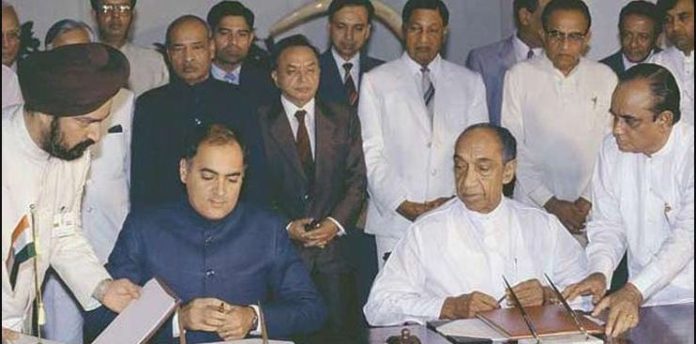Sri Lanka is a very interesting case in point, as far as Indian international diplomacy goes. India has, so far, responded to cries for help from the common man in the island nation by agreeing to provide more than one multi-billion dollar lines of credit. That is good, but as far as India’s interest goes, it isn’t enough. These days, India has been stressing on its own interest a lot, and this has been evident in the way India has been voting – or abstaining from voting, rather – in the Russian issue at the UN. If these lines of credit (to Sri Lanka) are to reap dividends for India, then it is pertinent that India promise deeper involvement in Lankan affairs of state.


As of now, the situation in Sri Lanka, going through its worst ever economic crisis, is in flux. Recently, the country’s courts finally woke up and the Colombo magistrate banned former Prime Minister Mahinda Rajapaksa, his politician son Namal and 15 allies from leaving the country over acts of violence against anti-government demonstrators. Remember that Mahinda’s younger brother, Gotabaya, the President, still sits on his throne, and has installed a sort of lame duck Prime Minster, 73-year-old Ranil Wickremesinghe, whose strength in parliament amounts to only one. Wickremesinghe is experienced and has been in the post before, so what the president might be wanting to do with this move is to send an international signal of his good intent.
However, before India can even think of wading into the Lanka mess, it has to keep in mind the complete disaster and loss of face that it suffered in signing the Indo-Sri Lanka Peace Accord in Colombo on July 29, 1987. It was signed by the then Prime Minister, Rajiv Gandhi and Sri Lankan president J. Jayewardene. What we all saw was that 15,000 Indian soldiers in the Indian Peace Keeping Force were slowly being drawn into guerrilla warfare, something that the LTTE was adept at and the result was the death of 1,240 officers and soldiers on both sides, plus 3,000 maimed. The IPFK was finally withdrawn by the V.P. Singh government in 1990, but India’s misadventure finally ended in the assassination of Rajiv Gandhi.
So why would India want to wade it at all? That is because there are huge economic and geopolitical gains waiting by the wings. This is not just about the Humbantota port which the Chinese have fully acquired. It is about the sea access that India can have for its goods through this country.
Obviously, the big bogey for India remains China. China’s ‘contribution’ has had a lot to do in the debt mountain of Sri Lanka. The intended default was not just because of the unusual spending habits of the Rajapaksas, but also because of the debt China has pushed down the islanders’ gullet. Hence India’s intervention, if at all, should be diplomatic and economic, even while keeping at bay the inordinately large influence China has had over Lanka.
Of course, with the Rajapaksas out of power – looks like Gotabaya will also be out soon – the new dispensation could be more India-centric and with India already having advanced billions of dollars of lines of credit, this is a great opportunity.
Sri Lanka will need reconstruction of basic needs – from food grains to fuel, to medicines and several other logistical help. India is the nearest neighbour and does not have the narrow business mind of the Chinese. Dual trade routes will also be helpful for both countries and could shore up the flagging Indian economy, at least in some segments.
If India takes the security angle out of the picture, and concentrates on the economic and humanitarian angles, this could be a god-gifted opportunity for the country.
It will not be easy, though. The entire Lankan economy will now have to run on the lines of the International Monetary Fund (IMF) and any debt reconstruction process will have to go through the world organisation. There will be a long period of austerity before the country can even think of returning to normalcy.
However, it will be a good effort. The opportunity has been godsend, so to say.













